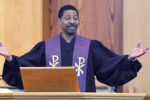 |
October 1-7: The use of the keys
What is the use of the keys?
The use of the keys is that special power and right which Christ gave to his church on earth: to forgive the sins of penitent sinners but refuse forgiveness to the impenitent as long as they do not repent.
321. What are the keys?
Matthew 16:19 I will give you the keys of the kingdom of heaven; whatever you bind on earth will be bound in heaven, and whatever you loose on earth will be loosed in heaven.
Matthew 18:18 Truly I tell you, whatever you bind on earth will be bound in heaven, and whatever you loose on earth will be loosed in heaven.
John 20:23 If you forgive anyone’s sins, their sins are forgiven; if you do not forgive them, they are not forgiven.
2 Corinthians 5:18-20 All this is from God, who reconciled us to him- self through Christ and gave us the ministry of reconciliation: that God was reconciling the world to himself in Christ, not counting people’s sins against them. And he has committed to us the message of reconciliation. We are therefore Christ’s ambassadors, as though God were making his appeal through us. We implore you on Christ’s behalf: Be reconciled to God.
The keys are the special power and right given to Christians to forgive sins or to refuse to forgive sins. The power and right to forgive sins is the loosing key. It opens the door to heaven, declaring the person free from the guilt and punishment of sin. The power and right to refuse to forgive sins is the binding key. It locks the door of heaven, binding the person to the guilt and condemnation of his or her sin.
322. To whom has God given the special power and right to use these keys?
John 20:19,21-23 On the evening of that first day of the week, when the disciples were together, with the doors locked for fear of the Jewish leaders, Jesus came and stood among them and said, “Peace be with you! . . . As the Father has sent me, I am sending you.” And with that he breathed on them and said, “Receive the Holy Spirit. If you forgive anyone’s sins, their sins are forgiven; if you do not forgive them, they are not forgiven.”
1 Peter 2:7,9 Now to you who believe, this stone is precious. But to those who do not believe, “The stone the builders rejected has become the cornerstone.” But you are a chosen people, a royal priesthood, a holy nation, God’s special possession, that you may declare the praises of him who called you out of darkness into his wonderful light.
Christ has given to all Christians (the church) the special power and right to forgive sins or to refuse to forgive sins.
324. When does God want us to use the loosing key?
1 John 1:9 If we confess our sins, he is faithful and just and will forgive us our sins and purify us from all unrighteousness.
Acts 3:19 Repent, then, and turn to God, so that your sins may be wiped out.
Psalm 51:17 My sacrifice, O God, is a broken spirit; a broken and contrite heart you, God, will not despise.
Luke 15:10 I tell you, there is rejoicing in the presence of the angels of God over one sinner who repents.
Luke 18:13,14 The tax collector stood at a distance. He would not even look up to heaven, but beat his breast and said, “God, have mercy on me, a sinner.” I tell you that this man, rather than the other, went home justified before God. For all those who exalt themselves will be humbled, and those who humble themselves will be exalted.
Jesus commands us to forgive the sins of those who repent.
326. When does God want us to use the binding key?
1 John 1:8,10 If we claim to be without sin, we deceive ourselves and the truth is not in us. If we claim we have not sinned, we make him out to be a liar and his word is not in us.
Luke 18:10-14 (Because the Pharisee did not repent, he had no forgiveness.)
Matthew 18:15-18 (If someone refuses to repent, we are to treat that person like an unbeliever.)
John 20:23 If you forgive anyone’s sins, their sins are forgiven; if you do not forgive them, they are not forgiven.
Jesus commands us to refuse to forgive the sins of those who do not repent.
Connections
Some people don’t believe that their sins are serious or even that they have sinned. Others are driven to despair when they think of their sins. Jesus has given the keys to the church in order to address the spiritual needs of both kinds of people. He once told a parable that helps us better understand when to use the binding key and when to use the loosing key.
Luke 18:9-14
Jesus’ parable makes it obvious that those like the Pharisee should not be given assurance that their sin is forgiven. In the Pharisee’s case, pride was getting in the way. In what different ways do you see pride showing itself in your life? Jesus’ parable also makes it obvious that those like the tax collector should hear the good news that their sin is forgiven. How might God lead you to have the same kind of humility the tax collector had?
Luther
God gave the key which binds so that we might not remain too confident in our sins, arrogant, barbarous, and without God; and the key which looses, that we should not despair in our sins. (LW 40:325ff)
October 8-14: Public use of the keys
330. How does God guide Christian congregations as they use the keys publicly?
Matthew 18:20 Where two or three gather in my name, there am I with them.
Ephesians 4:11,12 Christ himself gave the apostles, the prophets, the evangelists, the pastors and teachers, to equip his people for works of service, so that the body of Christ may be built up.
Titus 1:5 The reason I left you in Crete was that you might put in order what was left unfinished and appoint elders in every town, as I directed you.
Acts 14:23 Paul and Barnabas appointed elders for them in each church and, with prayer and fasting, committed them to the Lord, in whom they had put their trust.
1 Timothy 5:17 The elders who direct the affairs of the church well are worthy of double honor, especially those whose work is preaching and teaching.
Matthew 16:19 I will give you the keys of the kingdom of heaven; whatever you bind on earth will be bound in heaven, and whatever you loose on earth will be loosed in heaven.
God provides Christian congregations with leaders who are to faithfully guide the affairs of the congregation. Preaching and teaching God’s Word is one of the most important ways that they lead their congregations.
A closer look
Spiritual leaders
All Christians have the same rights and responsibilities, but God determined that spiritual leaders in the church (the office of the public ministry) will serve in the name of the members of the church to help Christians carry out their work. As it works in practical terms, Christians gathered together have the right to choose those who will help them grow and work together. Individual Christians may not assume positions of public leadership and ministry unless the other Christians ask or call them to do so. In addition, God gives Christians the freedom to implement specific roles of ministry that will meet their spiritual needs and then to call those who will work among them. For example, a congregation calls one or more pastors to take the lead in preaching and teaching God’s Word. A congregation may also call staff ministers, vicars, evangelists, teachers, and others to lead them in service to God. Consider what the early church did in Jerusalem as an example: “Brothers and sisters, choose seven men from among you who are known to be full of the Spirit and wisdom. We will turn this responsibility over to them” (Acts 6:3).
331. What qualifications has God established for those who serve in the public ministry?
Titus 1:5-9 Appoint elders in every town, as I directed you. An elder must be blameless, faithful to his wife, a man whose children believe and are not open to the charge of being wild and disobedient. Since an overseer manages God’s household, he must be blameless—not overbearing, not quick-tempered, not given to drunkenness, not violent, not pursuing dishonest gain. Rather, he must be hospitable, one who loves what is good, who is self-controlled, upright, holy and disciplined. He must hold firmly to the trustworthy message as it has been taught, so that he can encourage others by sound doctrine and refute those who oppose it.
1 Peter 5:2 Be shepherds of God’s flock that is under your care, watching over them—not because you must, but because you are willing, as God wants you to be; not pursuing dishonest gain, but eager to serve.
Acts 20:28 Keep watch over yourselves and all the flock of which the Holy Spirit has made you overseers. Be shepherds of the church of God, which he bought with his own blood.
334. How will the congregation with its called shepherd use the binding key?
Matthew 18:15-18 If your brother or sister sins, go and point out their fault, just between the two of you. If they listen to you, you have won them over. But if they will not listen, take one or two others along, so that “every matter may be established by the testimony of two or three witnesses.” If they still refuse to listen, tell it to the church; and if they refuse to listen even to the church, treat them as you would a pagan or a tax collector. Truly I tell you, whatever you bind on earth will be bound in heaven, and whatever you loose on earth will be loosed in heaven.
1 Corinthians 5:4,5,13 When you are assembled and I am with you in spirit, and the power of our Lord Jesus is present, hand this man over to Satan for the destruction of the flesh, so that his spirit may be saved on the day of the Lord. God will judge those outside. “Expel the wicked person from among you.”
1 Timothy 5:20 Those elders who are sinning you are to reprove before everyone, so that the others may take warning.
The congregation together with its pastor will use the binding key to exclude from the congregation those who are obviously impenitent—with the goal that they repent and receive forgiveness (church discipline).
335. How will the congregation with its called shepherd use the loosing key?
2 Corinthians 2:6-8,10 The punishment inflicted on him by the majority is sufficient. Now instead, you ought to forgive and comfort him, so that he will not be overwhelmed by excessive sorrow. I urge you, therefore, to reaffirm your love for him. Anyone you forgive, I also forgive. And what I have forgiven—if there was anything to forgive—I have forgiven in the sight of Christ for your sake.
They will use the loosing key to announce forgiveness to the person under church discipline who repents of his or her sin and will welcome the person back into the fellowship of the congregation.
Acts 26:18 Open their eyes and turn them from darkness to light, and from the power of Satan to God, so that they may receive forgiveness of sins and a place among those who are sanctified by faith in me.
They will use the loosing key to announce forgiveness to those who were formerly unbelievers but have now repented of their sins.
Isaiah 40:1,2 Comfort, comfort my people, says your God. Speak tenderly to Jerusalem, and proclaim to her that her hard service has been completed, that her sin has been paid for, that she has received from the LORD’s hand double for all her sins.
1 Thessalonians 2:11,12 You know that we dealt with each of you as a father deals with his own children, encouraging, comforting and urging you to live lives worthy of God, who calls you into his kingdom and glory.
The congregation asks its pastor to use the loosing key to announce forgiveness publicly in its worship services, as well as individually to those offering a private confession.
336. How are we to view the public use of the keys by a congregation with its pastor?
1 Corinthians 4:1 This, then, is how you ought to regard us: as servants of Christ and as those entrusted with the mysteries God has revealed.
Matthew 18:15-20 (Jesus gave the church the authority to forgive the sins of the penitent and to refuse to forgive the sins of the impenitent.)
Luke 10:16 Whoever listens to you listens to me; whoever rejects you rejects me; but whoever rejects me rejects him who sent me.
The public use of the keys by a congregation with its called pastor is as valid and certain in heaven also, as if Christ, our dear Lord, dealt with us himself.
October 15-21: Confession and absolution—Part one
Introduction
An old Scottish proverb says, “Confession is good for the soul.” Many people believe that proverb is true in a general way. Admitting a wrong can bring a measure of inner peace and help restore relationships with others.
When God speaks about confession, he is not simply interested in restoring earthly relationships or giving emotional peace. Sin has the power to break our relationships with God. Confession is important for our souls.
337. The word confess means to admit a wrong. The first part of confession is that we admit we are sinners who deserve to be punished for our sin. Why do we confess our sins?
Psalm 51:1 Have mercy on me, O God, according to your unfailing love; according to your great compassion blot out my transgressions.
Psalm 32:3,5 When I kept silent, my bones wasted away through my groaning all day long. Then I acknowledged my sin to you and did not cover up my iniquity. I said, “I will confess my transgressions to the LORD.” And you forgave the guilt of my sin.
1 John 1:8,9 If we claim to be without sin, we deceive ourselves and the truth is not in us. If we confess our sins, he is faithful and just and will forgive us our sins and purify us from all unrighteousness.
Luke 18:13 The tax collector stood at a distance. He would not even look up to heaven, but beat his breast and said, “God, have mercy on me, a sinner.”
James 5:16 Confess your sins to each other.
We confess our sins because God commands us to and because we long for forgiveness.
338. What do we acknowledge in our confessions to God?
Psalm 51:5 Surely I was sinful at birth, sinful from the time my mother conceived me.
Isaiah 64:6 All of us have become like one who is unclean, and all our righteous acts are like filthy rags; we all shrivel up like a leaf, and like the wind our sins sweep us away.
James 2:10 Whoever keeps the whole law and yet stumbles at just one point is guilty of breaking all of it.
Isaiah 59:12 Our offenses are many in your sight, and our sins testify against us. Our offenses are ever with us, and we acknowledge our iniquities.
Psalm 19:12 Who can discern their own errors? Forgive my hidden faults.
Romans 6:23 The wages of sin is death, but the gift of God is eternal life in Christ Jesus our Lord.
Romans 7:24 What a wretched man I am! Who will rescue me from this body that is subject to death?
We confess not only what we do but what we are. We were born with a sinful nature that continues to cause us to sin daily in thought, word, and deed. Our sins deserve eternal punishment.
339. How does God lead us to confess our sins?
Romans 3:20 No one will be declared righteous in God’s sight by the works of the law; rather, through the law we become conscious of our sin.
Romans 7:7 I would not have known what sin was had it not been for the law. For I would not have known what coveting really was if the law had not said, “You shall not covet.”
Psalm 38:3,6,18 Because of your wrath there is no health in my body; there is no soundness in my bones because of my sin. I am bowed down and brought very low; all day long I go about mourning. I confess my iniquity; I am troubled by my sin.
God’s law makes us aware of our sins—each of us according to our place in life, whether we are a father, mother, son, daughter, employer, or employee. It points out if we have been disobedient, unfaithful, or lazy; if we have hurt anyone with our words or by our actions; if we have been dishonest, careless, wasteful, or committed any other wrongs. The law makes us aware of the punishment we deserve because of our sins.
340. Confession has a second part. When God has led us to confess our sins, what announcement does he then make?
2 Samuel 12:1-13 (When David confessed his sins, Nathan announced that God had forgiven his sins.)
Luke 7:48 Jesus said to [the sinful woman], “Your sins are forgiven.”
Matthew 9:2 [Jesus told a paralyzed man,] “Take heart, son; your sins are forgiven.”
Hebrews 8:12 I will forgive their wickedness and will remember their sins no more.
October 22-28: Confession and absolution—Part two
341. When does the pastor regularly proclaim this comforting announcement?
Psalm 32:5 Then I acknowledged my sin to you and did not cover up my iniquity. I said, “I will confess my transgressions to the LORD.” And you forgave the guilt of my sin.
John 20:21-23 Again Jesus said, “Peace be with you! As the Father has sent me, I am sending you.” And with that he breathed on them and said, “Receive the Holy Spirit. If you forgive anyone’s sins, their sins are forgiven; if you do not forgive them, they are not forgiven.”
Our pastor regularly announces this gospel comfort in our worship services when he says, “As a called servant of Christ and by his authority, I forgive you all your sins in the name of the Father and of the Son and of the Holy Spirit.”
342. When is it beneficial to confess our sins privately to our pastor?
Psalm 32:4 Day and night your hand was heavy on me; my strength was sapped as in the heat of summer.
Psalm 38:4 My guilt has overwhelmed me like a burden too heavy to bear.
Psalm 51:3 I know my transgressions, and my sin is always before me.
We may privately confess our sins to the pastor at any time. We may seek the comforting gospel promise of forgiveness particularly when sins continue to trouble our consciences.
343. How should we receive the announcement of forgiveness from the pastor?
Matthew 16:19 I will give you the keys of the kingdom of heaven; whatever you bind on earth will be bound in heaven, and whatever you loose on earth will be loosed in heaven.
We receive absolution—forgiveness—from the pastor as from God himself, not doubting but firmly believing that our sins are forgiven before God in heaven.
A closer look
Private confession
Although Luther focused on private confession to one’s spiritual shepherd, he didn’t mean to imply that confessing sins to a Christian spouse or parent or friend was less important or less biblical. Rather, he was attempting to help people properly understand what had been the practice for many years, namely, confessing sins to one’s priest.
Although it isn’t mandatory, going to our spiritual shepherd to confess sins and receive absolution can continue to be a blessing today. We are grateful for our pastor’s knowledge of Scripture and his ability to bring comfort through the words of God.
344. When does God want us to confess our sins to a fellow Christian?
James 5:16 Confess your sins to each other and pray for each other.
Matthew 5:23,24 If you are offering your gift at the altar and there remember that your brother or sister has something against you, leave your gift there in front of the altar. First go and be reconciled to them; then come and offer your gift.
Luke 15:11-21 (The lost son came to realize the extent of his sin against his father and confessed his sin.)
345. How are we to receive the announcement of forgiveness from our fellow Christian?
John 20:21-23 Again Jesus said, “Peace be with you! As the Father has sent me, I am sending you.” And with that he breathed on them and said, “Receive the Holy Spirit. If you forgive anyone’s sins, their sins are forgiven; if you do not forgive them, they are not forgiven.”
Matthew 16:19 I will give you the keys of the kingdom of heaven; whatever you bind on earth will be bound in heaven, and whatever you loose on earth will be loosed in heaven.
We receive absolution—the declaration of forgiveness—from a fellow Christian as from God himself, not doubting but firmly believing that our sins are forgiven before God in heaven.
Connections
We can come up with many reasons not to confess a sin. Our pride gets in the way. We imagine the bad things that might happen once the truth gets out. We are ashamed.
Our sinful flesh works hard to keep us from admitting our wrongs, but God commands us to confess—and not because he wants to hurt us! Rather, God longs to bring great blessings to us, as is evident in Jesus’ parable about a son and his father.
Luke 15:11-32
How did God bring the young man to his senses so that he was willing to confess his sins to his father? How does God bring us to our senses about sin and lead us to confess? The reaction of the father in the parable is a picture of how our heavenly Father deals with our sin. How is the love God shows us similar to the love shown by the father in the story?
Luther
As to the current practice of private confession, I am heartily in favor of it. . . .
It is useful, even necessary, and I would not have it abolished. Indeed, I rejoice that it exists in the church of Christ for it is a cure without equal for distressed consciences. (LW 36:30ff)
From Depths of Woe I Cry to You (Stanzas 1,2)
From depths of woe I cry to you;
Lord, hear me, I implore you.
Bend down your gracious ear to me;
My prayer let come before you.
If you kept record of my sin
And held against me what I’ve been,
How could I stand before you?
Your love and grace alone avail
To blot out my transgression.
The best and holiest deeds must fail
To break sin’s dread oppression.
Before you none can boasting stand,
But all must fear your strict demand
And live alone by mercy.
- Back to the basics: The Ten Commandments
- Back to the basics: The Apostles’ Creed
- Back to the basics: Keys and confession
- Back to the basics: Baptism
- Back to the basics: The Lord’s Supper




